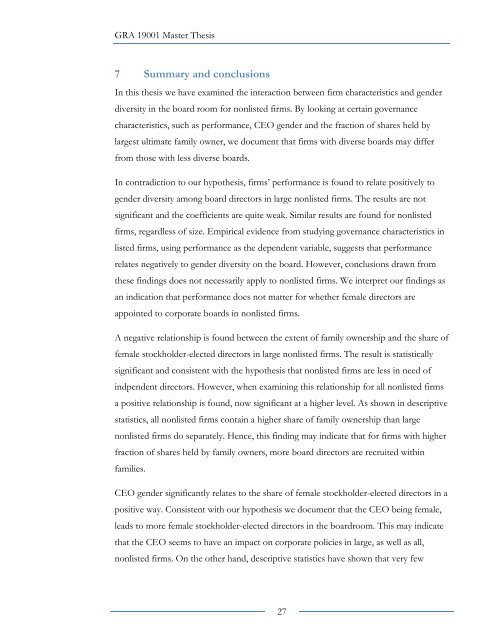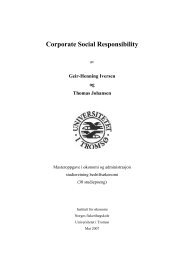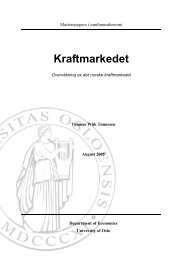Gender Diversity on the Board - BI Norwegian Business School
Gender Diversity on the Board - BI Norwegian Business School
Gender Diversity on the Board - BI Norwegian Business School
Create successful ePaper yourself
Turn your PDF publications into a flip-book with our unique Google optimized e-Paper software.
GRA 19001 Master Thesis<br />
7 Summary and c<strong>on</strong>clusi<strong>on</strong>s<br />
In this <strong>the</strong>sis we have examined <strong>the</strong> interacti<strong>on</strong> between firm characteristics and gender<br />
diversity in <strong>the</strong> board room for n<strong>on</strong>listed firms. By looking at certain governance<br />
characteristics, such as performance, CEO gender and <strong>the</strong> fracti<strong>on</strong> of shares held by<br />
largest ultimate family owner, we document that firms with diverse boards may differ<br />
from those with less diverse boards.<br />
In c<strong>on</strong>tradicti<strong>on</strong> to our hypo<strong>the</strong>sis, firms’ performance is found to relate positively to<br />
gender diversity am<strong>on</strong>g board directors in large n<strong>on</strong>listed firms. The results are not<br />
significant and <strong>the</strong> coefficients are quite weak. Similar results are found for n<strong>on</strong>listed<br />
firms, regardless of size. Empirical evidence from studying governance characteristics in<br />
listed firms, using performance as <strong>the</strong> dependent variable, suggests that performance<br />
relates negatively to gender diversity <strong>on</strong> <strong>the</strong> board. However, c<strong>on</strong>clusi<strong>on</strong>s drawn from<br />
<strong>the</strong>se findings does not necessarily apply to n<strong>on</strong>listed firms. We interpret our findings as<br />
an indicati<strong>on</strong> that performance does not matter for whe<strong>the</strong>r female directors are<br />
appointed to corporate boards in n<strong>on</strong>listed firms.<br />
A negative relati<strong>on</strong>ship is found between <strong>the</strong> extent of family ownership and <strong>the</strong> share of<br />
female stockholder-elected directors in large n<strong>on</strong>listed firms. The result is statistically<br />
significant and c<strong>on</strong>sistent with <strong>the</strong> hypo<strong>the</strong>sis that n<strong>on</strong>listed firms are less in need of<br />
indpendent directors. However, when examining this relati<strong>on</strong>ship for all n<strong>on</strong>listed firms<br />
a positive relati<strong>on</strong>ship is found, now significant at a higher level. As shown in descriptive<br />
statistics, all n<strong>on</strong>listed firms c<strong>on</strong>tain a higher share of family ownership than large<br />
n<strong>on</strong>listed firms do separately. Hence, this finding may indicate that for firms with higher<br />
fracti<strong>on</strong> of shares held by family owners, more board directors are recruited within<br />
families.<br />
CEO gender significantly relates to <strong>the</strong> share of female stockholder-elected directors in a<br />
positive way. C<strong>on</strong>sistent with our hypo<strong>the</strong>sis we document that <strong>the</strong> CEO being female,<br />
leads to more female stockholder-elected directors in <strong>the</strong> boardroom. This may indicate<br />
that <strong>the</strong> CEO seems to have an impact <strong>on</strong> corporate policies in large, as well as all,<br />
n<strong>on</strong>listed firms. On <strong>the</strong> o<strong>the</strong>r hand, descriptive statistics have shown that very few<br />
27
















